Onze nieuwigheden om op de hoogte te blijven in uw vakgebied
-
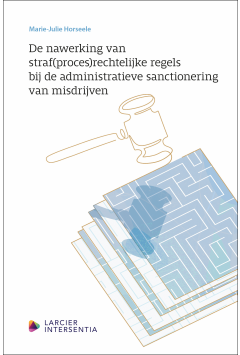 De nawerking van straf(proces)rechtelijke regels bij de administratieve sanctionering van misdrijvenBoek | 1ste editie 2024 | België | Marie-Julie Horseele€ 225,00 incl. btwIn voorraad verzonden binnen 2 werkdagen
De nawerking van straf(proces)rechtelijke regels bij de administratieve sanctionering van misdrijvenBoek | 1ste editie 2024 | België | Marie-Julie Horseele€ 225,00 incl. btwIn voorraad verzonden binnen 2 werkdagen -
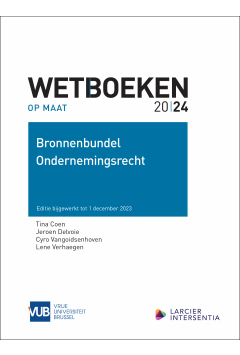 Bronnenbundel Ondernemingsrecht - VUB 2024Boek | 7e editie 2024 | België | Tina Coen, Jeroen Delvoie, Cyro Vangoidsenhoven, Lene Verhaegen€ 90,00 incl. btwStudentenprijs: € 38,00In voorraad verzonden binnen 2 werkdagen
Bronnenbundel Ondernemingsrecht - VUB 2024Boek | 7e editie 2024 | België | Tina Coen, Jeroen Delvoie, Cyro Vangoidsenhoven, Lene Verhaegen€ 90,00 incl. btwStudentenprijs: € 38,00In voorraad verzonden binnen 2 werkdagen -
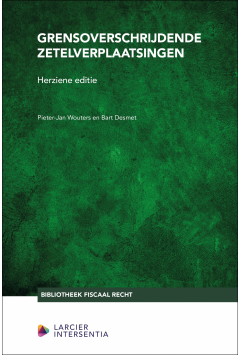 Grensoverschrijdende zetelverplaatsingenHerziene editieBoek | 2e editie 2024 | België | Pieter-Jan Wouters, Bart Desmet€ 95,00 incl. btwIn voorraad verzonden binnen 2 werkdagen
Grensoverschrijdende zetelverplaatsingenHerziene editieBoek | 2e editie 2024 | België | Pieter-Jan Wouters, Bart Desmet€ 95,00 incl. btwIn voorraad verzonden binnen 2 werkdagen -
 Rechtsdenken (tweede editie)Vade mecumBoek | 2e editie 2024 | België | Frank Fleerackers€ 83,00 incl. btwStudentenprijs: € 35,00In voorraad verzonden binnen 2 werkdagen
Rechtsdenken (tweede editie)Vade mecumBoek | 2e editie 2024 | België | Frank Fleerackers€ 83,00 incl. btwStudentenprijs: € 35,00In voorraad verzonden binnen 2 werkdagen -
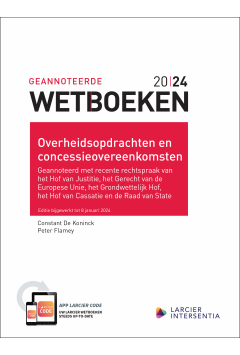 Wetboek Overheidsopdrachten en concessieovereenkomsten - 2024Geannoteerd met recente rechtspraak van het Hof van Justitie, het Gerecht van de EU, het Grondwettelijk Hof, het Hof van Cassatie en de Raad van StateWetboek | 7e editie 2024 | België | Constant De Koninck, Peter Flamey€ 125,00 incl. btwStudentenprijs: € 60,00In voorraad verzonden binnen 2 werkdagen
Wetboek Overheidsopdrachten en concessieovereenkomsten - 2024Geannoteerd met recente rechtspraak van het Hof van Justitie, het Gerecht van de EU, het Grondwettelijk Hof, het Hof van Cassatie en de Raad van StateWetboek | 7e editie 2024 | België | Constant De Koninck, Peter Flamey€ 125,00 incl. btwStudentenprijs: € 60,00In voorraad verzonden binnen 2 werkdagen -
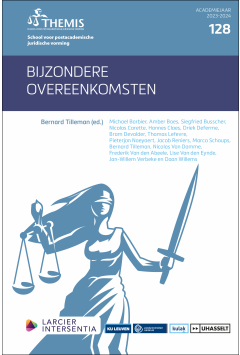 Themis 2023-2024 nr. 128 Bijzondere overeenkomstenBoek | 1ste editie 2024 | België | Bernard Tilleman€ 92,00 incl. btwIn voorraad verzonden binnen 2 werkdagen
Themis 2023-2024 nr. 128 Bijzondere overeenkomstenBoek | 1ste editie 2024 | België | Bernard Tilleman€ 92,00 incl. btwIn voorraad verzonden binnen 2 werkdagen -
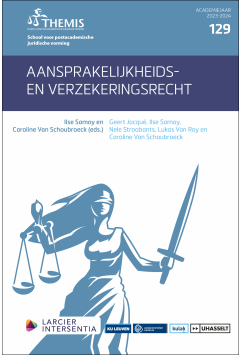 Themis 2023-2024 nr. 129 Aansprakelijkheids- en VerzekeringsrechtBoek | 1ste editie 2024 | België | Ilse Samoy, Caroline Van Schoubroeck€ 65,00 incl. btwIn voorraad verzonden binnen 2 werkdagen
Themis 2023-2024 nr. 129 Aansprakelijkheids- en VerzekeringsrechtBoek | 1ste editie 2024 | België | Ilse Samoy, Caroline Van Schoubroeck€ 65,00 incl. btwIn voorraad verzonden binnen 2 werkdagen -
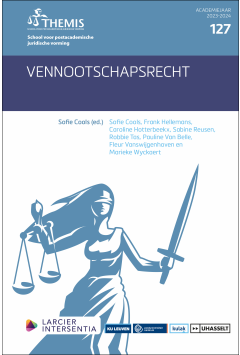 Themis 2023-2024 nr. 127 VennootschapsrechtBoek | 1ste editie 2024 | België | Sofie Cools€ 65,00 incl. btwIn voorraad verzonden binnen 2 werkdagen
Themis 2023-2024 nr. 127 VennootschapsrechtBoek | 1ste editie 2024 | België | Sofie Cools€ 65,00 incl. btwIn voorraad verzonden binnen 2 werkdagen -
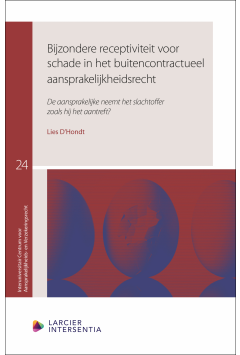 Bijzondere receptiviteit voor schade in het buitencontractueel aansprakelijkheidsrechtDe aansprakelijke neemt het slachtoffer zoals hij het aantreft?Boek | 1ste editie 2024 | België | Lies D'Hondt€ 165,00 incl. btwIn voorraad verzonden binnen 2 werkdagen
Bijzondere receptiviteit voor schade in het buitencontractueel aansprakelijkheidsrechtDe aansprakelijke neemt het slachtoffer zoals hij het aantreft?Boek | 1ste editie 2024 | België | Lies D'Hondt€ 165,00 incl. btwIn voorraad verzonden binnen 2 werkdagen -
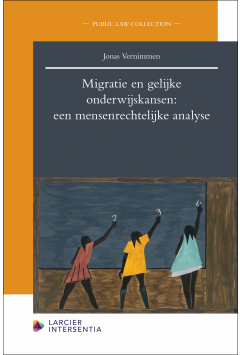 Migratie en gelijke onderwijskansen: een mensenrechtelijke analyseBoek | 1ste editie 2024 | België | Jonas Vernimmen€ 130,00 incl. btwIn voorraad verzonden binnen 2 werkdagen
Migratie en gelijke onderwijskansen: een mensenrechtelijke analyseBoek | 1ste editie 2024 | België | Jonas Vernimmen€ 130,00 incl. btwIn voorraad verzonden binnen 2 werkdagen -
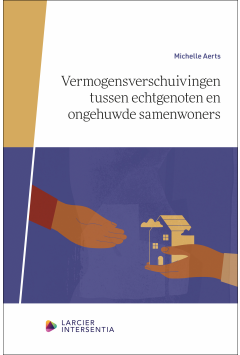 Vermogensverschuivingen tussen echtgenoten en ongehuwde samenwonersBoek | 1ste editie 2024 | België | Michelle Aerts€ 195,00 incl. btwIn voorraad verzonden binnen 2 werkdagen
Vermogensverschuivingen tussen echtgenoten en ongehuwde samenwonersBoek | 1ste editie 2024 | België | Michelle Aerts€ 195,00 incl. btwIn voorraad verzonden binnen 2 werkdagen -
 Notariële actualiteit 2022-2023Fiscaliteit - RechtspersoonBoek | 1ste editie 2024 | België | Frank Buyssens, Alain-Laurent Verbeke€ 70,00 incl. btwIn voorraad verzonden binnen 2 werkdagen
Notariële actualiteit 2022-2023Fiscaliteit - RechtspersoonBoek | 1ste editie 2024 | België | Frank Buyssens, Alain-Laurent Verbeke€ 70,00 incl. btwIn voorraad verzonden binnen 2 werkdagen -
 Anderstaligheid en rechtshandhavingHoe Babylonische spraakverwarringen vermijdenBoek | 1ste editie 2023 | Beatrix Vanlerberghe, Joëlle Rozie, Stefan Rutten€ 85,00 incl. btwIn voorraad verzonden binnen 2 werkdagen
Anderstaligheid en rechtshandhavingHoe Babylonische spraakverwarringen vermijdenBoek | 1ste editie 2023 | Beatrix Vanlerberghe, Joëlle Rozie, Stefan Rutten€ 85,00 incl. btwIn voorraad verzonden binnen 2 werkdagen -
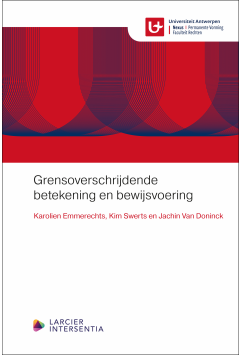 Grensoverschrijdende betekening en bewijsvoeringBoek | 1ste editie 2024 | België | Jachin Van Doninck, Wannes Vandenbussche, Max De Schryver, Karolien Emmerechts€ 65,00 incl. btwIn voorraad verzonden binnen 2 werkdagen
Grensoverschrijdende betekening en bewijsvoeringBoek | 1ste editie 2024 | België | Jachin Van Doninck, Wannes Vandenbussche, Max De Schryver, Karolien Emmerechts€ 65,00 incl. btwIn voorraad verzonden binnen 2 werkdagen -
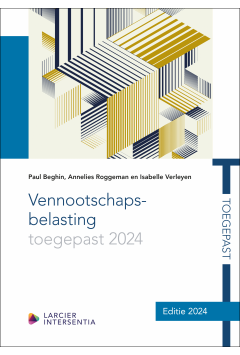 Vennootschapsbelasting toegepast 2024Boek | 8e editie 2024 | België | Paul Beghin, Annelies Roggeman, Isabelle Verleyen€ 65,00 incl. btwStudentenprijs: € 37,00In voorraad verzonden binnen 2 werkdagen
Vennootschapsbelasting toegepast 2024Boek | 8e editie 2024 | België | Paul Beghin, Annelies Roggeman, Isabelle Verleyen€ 65,00 incl. btwStudentenprijs: € 37,00In voorraad verzonden binnen 2 werkdagen -
 Fiscaal recht in essentie 2024Boek | 1ste editie 2024 | België | Inge Van De Woesteyne€ 65,00 incl. btwStudentenprijs: € 37,00In voorraad verzonden binnen 2 werkdagen
Fiscaal recht in essentie 2024Boek | 1ste editie 2024 | België | Inge Van De Woesteyne€ 65,00 incl. btwStudentenprijs: € 37,00In voorraad verzonden binnen 2 werkdagen -
 The Legal SymphonyDe rollen van bedrijfsjuristen in een veranderende wereld / Les rôles des juristes d’entreprise dans un monde en mutationBoek | 1ste editie 2023 | België | Els Steen€ 99,00 incl. btwIn voorraad verzonden binnen 2 werkdagen
The Legal SymphonyDe rollen van bedrijfsjuristen in een veranderende wereld / Les rôles des juristes d’entreprise dans un monde en mutationBoek | 1ste editie 2023 | België | Els Steen€ 99,00 incl. btwIn voorraad verzonden binnen 2 werkdagen -
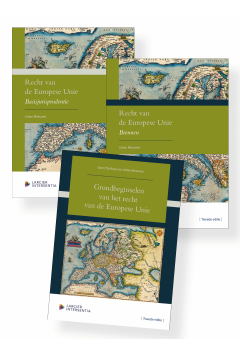 Recht van de Europese Unie (set)Boek | 1ste editie 2024 | België | Geert De Baere, Johan Meeusen€ 265,20 incl. btwIn voorraad verzonden binnen 2 werkdagen
Recht van de Europese Unie (set)Boek | 1ste editie 2024 | België | Geert De Baere, Johan Meeusen€ 265,20 incl. btwIn voorraad verzonden binnen 2 werkdagen -
 De erfenis van JustinianusRomeinse grondslagen van het privaatrechtBoek | 1ste editie 2024 | België | Jan Hallebeek, Tammo Wallinga€ 95,00 incl. btwStudentenprijs: € 35,00In voorraad verzonden binnen 2 werkdagen
De erfenis van JustinianusRomeinse grondslagen van het privaatrechtBoek | 1ste editie 2024 | België | Jan Hallebeek, Tammo Wallinga€ 95,00 incl. btwStudentenprijs: € 35,00In voorraad verzonden binnen 2 werkdagen -
 Tendensen Vermogensrecht 2022Boek | 1ste editie 2023 | België | Renate Barbaix, Nicolas Carette€ 99,00 incl. btwIn voorraad verzonden binnen 2 werkdagen
Tendensen Vermogensrecht 2022Boek | 1ste editie 2023 | België | Renate Barbaix, Nicolas Carette€ 99,00 incl. btwIn voorraad verzonden binnen 2 werkdagen
Onze digitale oplossingen om u en uw klanten tijd te besparen
Onze opleidingen om uw kennis te vergroten
Larcier-Intersentia organiseert op regelmatige basis samen met externe partners en organisaties zowel fysieke opleidingen als webinars (live en on demand).
Nieuw in de reeks Tips en Advies
-
 Het zakboekje voor de zelfstandigeAangepast aan talrijke nieuwe wetswijzigingenBoek | 15e editie 2024 | België | Het redactieteam van Tips & Advies€ 82,00 incl. btwIn voorraad verzonden binnen 2 werkdagen
Het zakboekje voor de zelfstandigeAangepast aan talrijke nieuwe wetswijzigingenBoek | 15e editie 2024 | België | Het redactieteam van Tips & Advies€ 82,00 incl. btwIn voorraad verzonden binnen 2 werkdagen -
 Veilig en correct factureren als aannemer in 2024Boek | 15e editie 2024 | België | Marc Govers€ 135,00 incl. btwIn voorraad verzonden binnen 2 werkdagen
Veilig en correct factureren als aannemer in 2024Boek | 15e editie 2024 | België | Marc Govers€ 135,00 incl. btwIn voorraad verzonden binnen 2 werkdagen -
 Trouwen, wettelijk of feitelijk samenwonen?Wat zijn voor u als zelfstandige de praktische, fiscale en juridische gevolgen van uw keuze?Boek | 2e editie 2024 | België | Lars Everaert€ 135,00 incl. btwIn voorraad verzonden binnen 2 werkdagen
Trouwen, wettelijk of feitelijk samenwonen?Wat zijn voor u als zelfstandige de praktische, fiscale en juridische gevolgen van uw keuze?Boek | 2e editie 2024 | België | Lars Everaert€ 135,00 incl. btwIn voorraad verzonden binnen 2 werkdagen -
 Wanneer kiezen voor uitkering van dividenden, tantièmes en interesten i.p.v. extra loon?Hoe het belastbaar resultaat drukken met een voor u netto voordelige uitkering?Boek | 6e editie 2024 | België | Felix Vanden Heede€ 135,00 incl. btwIn voorraad verzonden binnen 2 werkdagen
Wanneer kiezen voor uitkering van dividenden, tantièmes en interesten i.p.v. extra loon?Hoe het belastbaar resultaat drukken met een voor u netto voordelige uitkering?Boek | 6e editie 2024 | België | Felix Vanden Heede€ 135,00 incl. btwIn voorraad verzonden binnen 2 werkdagen -
 Hoe optimaal uw rekening-courant gebruiken?Boek | 14e editie 2024 | België | Felix Vanden Heede€ 135,00 incl. btwIn voorraad verzonden binnen 2 werkdagen
Hoe optimaal uw rekening-courant gebruiken?Boek | 14e editie 2024 | België | Felix Vanden Heede€ 135,00 incl. btwIn voorraad verzonden binnen 2 werkdagen -
 Btw: veilig en correct factureren in 2024Wat is er gewijzigd inzake uw uitgaande en inkomende facturen?Boek | 10e editie 2024 | België | Marc Govers€ 135,00 incl. btwIn voorraad verzonden binnen 2 werkdagen
Btw: veilig en correct factureren in 2024Wat is er gewijzigd inzake uw uitgaande en inkomende facturen?Boek | 10e editie 2024 | België | Marc Govers€ 135,00 incl. btwIn voorraad verzonden binnen 2 werkdagen -
 Een goedkope bonus voor het personeelVijf systemen om een bonus toe te kennenBoek | 2024 | België | Het redactieteam van Tips & Advies€ 135,00 incl. btwIn voorraad verzonden binnen 2 werkdagen
Een goedkope bonus voor het personeelVijf systemen om een bonus toe te kennenBoek | 2024 | België | Het redactieteam van Tips & Advies€ 135,00 incl. btwIn voorraad verzonden binnen 2 werkdagen -
 Uitgaven op de grens van privé/beroep via uw vennootschap doenBoek | 10e editie 2024 | België | Felix Vanden Heede€ 135,00 incl. btwIn voorraad verzonden binnen 2 werkdagen
Uitgaven op de grens van privé/beroep via uw vennootschap doenBoek | 10e editie 2024 | België | Felix Vanden Heede€ 135,00 incl. btwIn voorraad verzonden binnen 2 werkdagen -
 Een praktische handleiding voor wie een ontslag om dringende reden overweegtBoek | 5e editie 2024 | België | Het redactieteam van Tips & Advies€ 165,00 incl. btwIn voorraad verzonden binnen 2 werkdagen
Een praktische handleiding voor wie een ontslag om dringende reden overweegtBoek | 5e editie 2024 | België | Het redactieteam van Tips & Advies€ 165,00 incl. btwIn voorraad verzonden binnen 2 werkdagen -
 De ondernemersgids - Editie 2024Alle basisinformatie voor elke zelfstandigeBoek | 21ste editie 2024 | België | Griet Pals€ 209,00 incl. btwIn voorraad verzonden binnen 2 werkdagen
De ondernemersgids - Editie 2024Alle basisinformatie voor elke zelfstandigeBoek | 21ste editie 2024 | België | Griet Pals€ 209,00 incl. btwIn voorraad verzonden binnen 2 werkdagen -
 Hoe de jaarrekening van een bedrijf correct 'lezen'?Ontcijfer en schat de financiële situatie correct in!Boek | 12e editie 2024 | België | Karel Nijs€ 135,00 incl. btwIn voorraad verzonden binnen 2 werkdagen
Hoe de jaarrekening van een bedrijf correct 'lezen'?Ontcijfer en schat de financiële situatie correct in!Boek | 12e editie 2024 | België | Karel Nijs€ 135,00 incl. btwIn voorraad verzonden binnen 2 werkdagen -
 U kiest voor het definitief opdoeken van uw vennootschapHoe dit zo optimaal mogelijk aanpakken?Boek | 6e editie 2024 | België | Wim De Buyser, Marc Govers, Felix Vanden Heede€ 165,00 € 132,00 incl. btwIn voorraad verzonden binnen 2 werkdagen
U kiest voor het definitief opdoeken van uw vennootschapHoe dit zo optimaal mogelijk aanpakken?Boek | 6e editie 2024 | België | Wim De Buyser, Marc Govers, Felix Vanden Heede€ 165,00 € 132,00 incl. btwIn voorraad verzonden binnen 2 werkdagen -
 Werken met een maatschap om uw vermogen over te dragenUw onderneming en uw vermogen optimaal overdragen met behoud van inkomsten en controleBoek | 10e editie 2024 | België | Anne Meyus€ 135,00 incl. btwIn voorraad verzonden binnen 2 werkdagen
Werken met een maatschap om uw vermogen over te dragenUw onderneming en uw vermogen optimaal overdragen met behoud van inkomsten en controleBoek | 10e editie 2024 | België | Anne Meyus€ 135,00 incl. btwIn voorraad verzonden binnen 2 werkdagen -
 De zorgvolmacht in het kader van uw successieplanningBoek | 1ste editie 2024 | België | Anne Meyus€ 165,00 incl. btwIn voorraad verzonden binnen 2 werkdagen
De zorgvolmacht in het kader van uw successieplanningBoek | 1ste editie 2024 | België | Anne Meyus€ 165,00 incl. btwIn voorraad verzonden binnen 2 werkdagen -
 21 technieken om te schenken zonder schenkbelastingWat u vooraf moet weten!Boek | 2e editie 2024 | België | Johan Adriaens€ 165,00 incl. btwIn voorraad verzonden binnen 2 werkdagen
21 technieken om te schenken zonder schenkbelastingWat u vooraf moet weten!Boek | 2e editie 2024 | België | Johan Adriaens€ 165,00 incl. btwIn voorraad verzonden binnen 2 werkdagen -
 Vermogens- en successieplanning in nieuw samengestelde gezinnenBoek | 6e editie 2024 | België | Anne Meyus€ 135,00 incl. btwIn voorraad verzonden binnen 2 werkdagen
Vermogens- en successieplanning in nieuw samengestelde gezinnenBoek | 6e editie 2024 | België | Anne Meyus€ 135,00 incl. btwIn voorraad verzonden binnen 2 werkdagen -
 Successieplanning met onroerend goed: nieuwe mogelijkheden, nieuwe opportuniteitenNu eenvoudiger en voordeliger vastgoed doorgevenBoek | 5e editie 2024 | België | Anne Meyus€ 135,00 incl. btwIn voorraad verzonden binnen 2 werkdagen
Successieplanning met onroerend goed: nieuwe mogelijkheden, nieuwe opportuniteitenNu eenvoudiger en voordeliger vastgoed doorgevenBoek | 5e editie 2024 | België | Anne Meyus€ 135,00 incl. btwIn voorraad verzonden binnen 2 werkdagen -
 Het abc van aftrekbare kosten voor eenmanszakenUw garantie dat u in 2024 aan uw boekhouder alle mogelijke fiscaal aftrekbare kosten doorspeeltBoek | 17e editie 2024 | België | Marc Govers€ 165,00 incl. btwIn voorraad verzonden binnen 2 werkdagen
Het abc van aftrekbare kosten voor eenmanszakenUw garantie dat u in 2024 aan uw boekhouder alle mogelijke fiscaal aftrekbare kosten doorspeeltBoek | 17e editie 2024 | België | Marc Govers€ 165,00 incl. btwIn voorraad verzonden binnen 2 werkdagen -
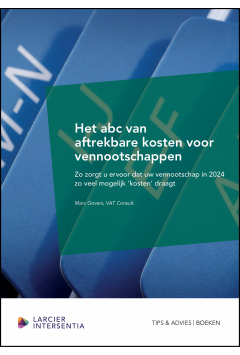 Het abc van aftrekbare kosten voor vennootschappenZo zorgt u ervoor dat uw vennootschap in 2024 zo veel mogelijk 'kosten' draagtBoek | 17e editie 2024 | België | Marc Govers€ 165,00 € 132,00 incl. btwIn voorraad verzonden binnen 2 werkdagen
Het abc van aftrekbare kosten voor vennootschappenZo zorgt u ervoor dat uw vennootschap in 2024 zo veel mogelijk 'kosten' draagtBoek | 17e editie 2024 | België | Marc Govers€ 165,00 € 132,00 incl. btwIn voorraad verzonden binnen 2 werkdagen -
 Hoe haalt u optimaal geld uit uw vennootschap?Handleiding om uzelf als bedrijfsleider een fiscaal vriendelijk inkomen uit te kerenBoek | 18e editie 2024 | België | Felix Vanden Heede€ 165,00 € 132,00 incl. btwIn voorraad verzonden binnen 2 werkdagen
Hoe haalt u optimaal geld uit uw vennootschap?Handleiding om uzelf als bedrijfsleider een fiscaal vriendelijk inkomen uit te kerenBoek | 18e editie 2024 | België | Felix Vanden Heede€ 165,00 € 132,00 incl. btwIn voorraad verzonden binnen 2 werkdagen
Uitgaven voor het hoger onderwijs
We geven uw studenten de beste kans op succes in hun professionele loopbaan!
Ontdek het meest recente aanbod ook in onze catalogus.
Wilt u een papieren exemplaar? Stuur dan een e-mail naar hoger.onderwijs@larcier-intersentia.com.
Bent u op zoek naar studiemateriaal voor het hoger onderwijs? Voor de studierichtingen Recht, Economische wetenschappen en Sociale wetenschappen bieden we:
- referentiewerken,
- op maat van uw studenten,
- aangevuld met elektronische interactieve oefeningen,
- waarmee u als docent onmiddellijk van start kan gaan,
- en dit alles voor een studentvriendelijk budget.
Onze gratis artikels om de actualiteit te volgen
Whitepaper


Fiscaal | Oktober 2023
Witwaspreventie: kent u de verplichtingen voor uw kantoor? | Whitepaper
Is de huidige Antiwitwaswet ook voor u onbekende materie? Deze gratis whitepaper helpt u op weg en bundelt overzichtelijk alles wat u moet weten over de AML-wet. Download de whitepaper.
Meest recent interview


Gerechtelijk | April 2024
De gerechtsdeskundige: een grondige analyse | Tom Toremans
Larcier-Intersentia interviewde de auteur mr. Tom Toremans naar aanleiding van deze nieuwe publicatie. In dit interview schetst de auteur waarom er, ondertussen een tiental jaar geleden, werd geopteerd voor een nationaal register, wat een drastische vernieuwing was en nadien trouwens gevolgd werd door een hele resem regelgeving. Verder bestaat de publicatie uit drie grondig uitgewerkte delen: de praktijk van het nationaal register, de uitlegging van de deontologische code en de toepassing ervan in de tucht en daarbuiten. De auteur geeft kort een overzicht van wat allemaal aan bod komt. Lees meer.
Meest recent artikel


Publiek | April 2024
Rechtspraak Antwerpen Brussel Gent, kortweg RABG, ontsluit tweemaal per maand vernieuwende en interessante rechtspraak en wetgeving. Vooraanstaande juristen bieden een boeiende kijk op thematisch gestructureerde rechtspraak, aangevuld met diverse informatie voor de praktijkjurist. In RABG 2023/19, dat gaat over intellectuele rechten en gegevensbescherming, wordt traditiegetrouw een selectie gemaakt van een aantal interessante vonnissen en arresten. Larcier-Intersentia selecteerde voor dit artikel twee gerechtelijke uitspraken die in het RABG-nummer aan bod komen. Lees meer.
1500 gespecialiseerde en gerenommeerde auteurs tot uw dienst
Erkende betalingspartners




